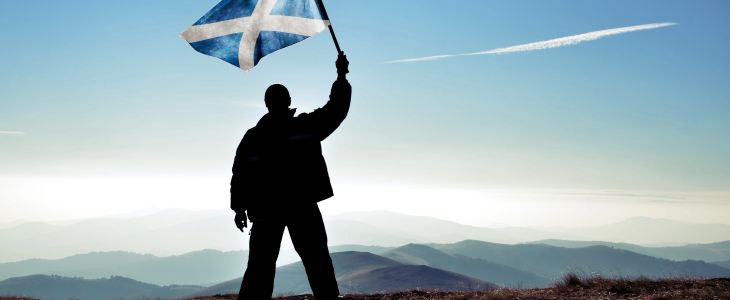Dreaming of studying in the UK?
For some universities/courses in the UK it is important that you
apply before January 14th as this is the deadline for equal consideration.
For more information on whether this deadline applies to you:

A Guide to Scottish Terminology for Canadian Students
Written by Advisor Lauren - 23/11/2023
Ever thought about studying in Scotland?
Studying in the UK can bring about a bit of a culture shock; while a lot of things seem similar to Canada, there are definitely some difference that can take some adjusting, or some learning. One of those things is Scottish terminology; while English is the main language in Scotland, they do integrate quite a few Gaelic (gall-ic) words and Scots phrases into everyday vernacular that you’ll want to be familiar with before you start your studies!
Scotland has three native languages: English, Gaelic, and Scots. Scottish Gaelic (or Gàidhlig pronounced gall-ic) is specific to Scotland and is different to the Gaelic (gay-lic) spoken in Ireland – this is commonly referred to locally as Irish. On the other hand, Scots is the umbrella name for local dialects spoken across Scotland, and is neither English nor Gaelic, but something its own. You can learn more about the Scots language here. Our blog post will cover the most common phrases you may come across during your studies in Scotland! I am by no means an expert in either language, but these were the phrases that I encountered during my studies.
Whether you're just starting to consider your options to study abroad or have already applied and are starting your predeparture preparations, we think learning these phrases will make you a little more comfortable on your arrival. If you have any other questions about studying in Scotland, we'd be happy to help!
Slainte Mhath (slan-cha va) – Sometimes shortened to just “Slainte” (slan-cha), this is the Gaelic way to say cheers. You will still hear locals saying “cheers”, usually in a way that means “thanks”, but slainte is used when cheers in a pub, or at dinner. In English, it means “good health”, or “cheers to your health.”
Wee – Small. Almost anything can be wee; a wee child, a wee snack, a wee drink. You’ll hear it frequently.
Aye – The most common Scottish phrase that people know, “aye” means yes in simple terms. However, people tend to use it like Canadians use “Eh” – in agreement, as a question, or a kind of catch all phrase.
Nae – By itself “nae” generally means no in simple terms. However, when attached as a suffix to verb, it can mean “not”. See the below two examples the most common ways you’ll hear this:
Ah Ken / Ah dinnae ken (dinn-y ken) – “Ken” means to “know”. If someone says “I ken”, they simply mean “I know.” On the flip side, if you hear “Ah dinnae ken”, it means “I don’t know” – a classic Scots phrase.
Cannae (cann-y) – a Scots way of saying “cannot”.
Bonny – beautiful. Typically used to refer to a woman or girl (lass/lassy).
Dreich (dre-ich) – a way to refer to the weather, it typically means a miserable, cold, wet day. As I’m sure you can imagine, it comes up frequently.
Scran – A way to refer to food. Commonly used like: “Let’s go get some scran”.
Och – less of a word than an exclamation, like “Oh”. “Och aye” is a common affirmative phrase, which simply means “oh yeah”.
Tattie – Potato. Commonly heard with “tattie scone” or “haggis, neaps and tatties”, traditionally Scottish foods.
IRN BRU (Iron Brew) – A type of soft drink created it Scotland, it is the most popular choice when it comes to soda in Scotland. You’ll see it’s bright orange colour everywhere, and I find it tastes like cotton candy and orange soda. Others say bubble gum, and no one really knows what it is, but it is incredibly popular.
Now, let’s finish up with the various words and terms the Scots have for drunk. Aside from IRN BRU, Scottish people generally love whisky – so of course they need some words to describe the feeling it brings. Blottered, Steamin, Oot your tree (out your tree) and Mad wae it (mad with it) are some of my personal favourites, but there are dozens of terms you may hear on your adventures to the student pubs.
Bonus: Have you ever sang Auld Lang Syne on New Year’s Eve? This is a Scots phrase, meaning “times long past”. It was originally a poem written by Robert Burns, a famous Scottish poet, based on an older folk song.
If you want the chance to learn speak like Jamie from Outlander, what better way than to go full immersion while you study in Scotland. You can do a 1-year master's (or a full undergraduate degree) and embrace every aspect of Scottish culture. If you have any interest in studying in Scotland, we can help you to make that dream possible! Speak with one of our advisors to find out more about your options!